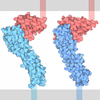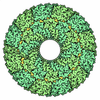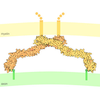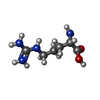[English] 日本語
 Yorodumi
Yorodumi- PDB-7xyq: Crystal strucutre of PD-L1 and the computationally designed DBL1_... -
+ Open data
Open data
- Basic information
Basic information
| Entry | Database: PDB / ID: 7xyq | ||||||
|---|---|---|---|---|---|---|---|
| Title | Crystal strucutre of PD-L1 and the computationally designed DBL1_03 protein binder | ||||||
 Components Components |
| ||||||
 Keywords Keywords | IMMUNE SYSTEM / PD-L1 | ||||||
| Function / homology |  Function and homology information Function and homology informationpositive regulation of tolerance induction to tumor cell / negative regulation of tumor necrosis factor superfamily cytokine production / positive regulation of activated CD8-positive, alpha-beta T cell apoptotic process / negative regulation of CD8-positive, alpha-beta T cell activation / TRIF-dependent toll-like receptor signaling pathway / negative regulation of CD4-positive, alpha-beta T cell proliferation / negative regulation of interleukin-10 production / negative regulation of activated T cell proliferation / negative regulation of type II interferon production / positive regulation of interleukin-10 production ...positive regulation of tolerance induction to tumor cell / negative regulation of tumor necrosis factor superfamily cytokine production / positive regulation of activated CD8-positive, alpha-beta T cell apoptotic process / negative regulation of CD8-positive, alpha-beta T cell activation / TRIF-dependent toll-like receptor signaling pathway / negative regulation of CD4-positive, alpha-beta T cell proliferation / negative regulation of interleukin-10 production / negative regulation of activated T cell proliferation / negative regulation of type II interferon production / positive regulation of interleukin-10 production / T cell costimulation / response to cytokine / positive regulation of T cell proliferation / recycling endosome membrane / actin cytoskeleton / cellular response to lipopolysaccharide / early endosome membrane / transcription coactivator activity / cell surface receptor signaling pathway / immune response / external side of plasma membrane / extracellular exosome / nucleoplasm Similarity search - Function | ||||||
| Biological species |  Homo sapiens (human) Homo sapiens (human)synthetic construct (others) | ||||||
| Method |  X-RAY DIFFRACTION / X-RAY DIFFRACTION /  SYNCHROTRON / SYNCHROTRON /  MOLECULAR REPLACEMENT / Resolution: 2.85 Å MOLECULAR REPLACEMENT / Resolution: 2.85 Å | ||||||
 Authors Authors | Liu, K. / Xu, Z. / Han, P. / Pacesa, M. / Gao, G.F. / Chai, Y. / Tan, S. | ||||||
| Funding support |  China, 1items China, 1items
| ||||||
 Citation Citation |  Journal: Nature / Year: 2023 Journal: Nature / Year: 2023Title: De novo design of protein interactions with learned surface fingerprints. Authors: Pablo Gainza / Sarah Wehrle / Alexandra Van Hall-Beauvais / Anthony Marchand / Andreas Scheck / Zander Harteveld / Stephen Buckley / Dongchun Ni / Shuguang Tan / Freyr Sverrisson / Casper ...Authors: Pablo Gainza / Sarah Wehrle / Alexandra Van Hall-Beauvais / Anthony Marchand / Andreas Scheck / Zander Harteveld / Stephen Buckley / Dongchun Ni / Shuguang Tan / Freyr Sverrisson / Casper Goverde / Priscilla Turelli / Charlène Raclot / Alexandra Teslenko / Martin Pacesa / Stéphane Rosset / Sandrine Georgeon / Jane Marsden / Aaron Petruzzella / Kefang Liu / Zepeng Xu / Yan Chai / Pu Han / George F Gao / Elisa Oricchio / Beat Fierz / Didier Trono / Henning Stahlberg / Michael Bronstein / Bruno E Correia /    Abstract: Physical interactions between proteins are essential for most biological processes governing life. However, the molecular determinants of such interactions have been challenging to understand, even ...Physical interactions between proteins are essential for most biological processes governing life. However, the molecular determinants of such interactions have been challenging to understand, even as genomic, proteomic and structural data increase. This knowledge gap has been a major obstacle for the comprehensive understanding of cellular protein-protein interaction networks and for the de novo design of protein binders that are crucial for synthetic biology and translational applications. Here we use a geometric deep-learning framework operating on protein surfaces that generates fingerprints to describe geometric and chemical features that are critical to drive protein-protein interactions. We hypothesized that these fingerprints capture the key aspects of molecular recognition that represent a new paradigm in the computational design of novel protein interactions. As a proof of principle, we computationally designed several de novo protein binders to engage four protein targets: SARS-CoV-2 spike, PD-1, PD-L1 and CTLA-4. Several designs were experimentally optimized, whereas others were generated purely in silico, reaching nanomolar affinity with structural and mutational characterization showing highly accurate predictions. Overall, our surface-centric approach captures the physical and chemical determinants of molecular recognition, enabling an approach for the de novo design of protein interactions and, more broadly, of artificial proteins with function. | ||||||
| History |
|
- Structure visualization
Structure visualization
| Structure viewer | Molecule:  Molmil Molmil Jmol/JSmol Jmol/JSmol |
|---|
- Downloads & links
Downloads & links
- Download
Download
| PDBx/mmCIF format |  7xyq.cif.gz 7xyq.cif.gz | 155.3 KB | Display |  PDBx/mmCIF format PDBx/mmCIF format |
|---|---|---|---|---|
| PDB format |  pdb7xyq.ent.gz pdb7xyq.ent.gz | 117.5 KB | Display |  PDB format PDB format |
| PDBx/mmJSON format |  7xyq.json.gz 7xyq.json.gz | Tree view |  PDBx/mmJSON format PDBx/mmJSON format | |
| Others |  Other downloads Other downloads |
-Validation report
| Arichive directory |  https://data.pdbj.org/pub/pdb/validation_reports/xy/7xyq https://data.pdbj.org/pub/pdb/validation_reports/xy/7xyq ftp://data.pdbj.org/pub/pdb/validation_reports/xy/7xyq ftp://data.pdbj.org/pub/pdb/validation_reports/xy/7xyq | HTTPS FTP |
|---|
-Related structure data
| Related structure data |  7xadC 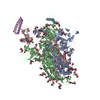 7zrvC 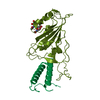 7zsdC 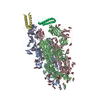 7zssC C: citing same article ( |
|---|---|
| Similar structure data | Similarity search - Function & homology  F&H Search F&H Search |
- Links
Links
- Assembly
Assembly
| Deposited unit | 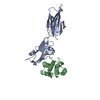
| ||||||||||||
|---|---|---|---|---|---|---|---|---|---|---|---|---|---|
| 1 |
| ||||||||||||
| Unit cell |
|
- Components
Components
| #1: Protein | Mass: 23757.910 Da / Num. of mol.: 1 Source method: isolated from a genetically manipulated source Source: (gene. exp.)  Homo sapiens (human) / Gene: CD274 / Production host: Homo sapiens (human) / Gene: CD274 / Production host:  |
|---|---|
| #2: Protein | Mass: 14001.120 Da / Num. of mol.: 1 Source method: isolated from a genetically manipulated source Source: (gene. exp.) synthetic construct (others) / Production host:  |
| #3: Chemical | ChemComp-ARG / |
| #4: Water | ChemComp-HOH / |
| Has protein modification | Y |
-Experimental details
-Experiment
| Experiment | Method:  X-RAY DIFFRACTION / Number of used crystals: 1 X-RAY DIFFRACTION / Number of used crystals: 1 |
|---|
- Sample preparation
Sample preparation
| Crystal | Density Matthews: 3.35 Å3/Da / Density % sol: 58.85 % |
|---|---|
| Crystal grow | Temperature: 291 K / Method: evaporation Details: 0.02 M nickel (II) chloride hexahydrate, 0.02 M magnesium chloride hexahydrate, 0.02 M cadmium chloride hydrate, 0.1 M sodium acetate trihydrate, pH4.5, 24% w/v polyethylene glycol monomethylether 2000 |
-Data collection
| Diffraction | Mean temperature: 100 K / Serial crystal experiment: N |
|---|---|
| Diffraction source | Source:  SYNCHROTRON / Site: SYNCHROTRON / Site:  SSRF SSRF  / Beamline: BL17U1 / Wavelength: 0.97889 Å / Beamline: BL17U1 / Wavelength: 0.97889 Å |
| Detector | Type: ADSC QUANTUM 315r / Detector: CCD / Date: Jan 6, 2019 |
| Radiation | Protocol: SINGLE WAVELENGTH / Monochromatic (M) / Laue (L): M / Scattering type: x-ray |
| Radiation wavelength | Wavelength: 0.97889 Å / Relative weight: 1 |
| Reflection | Resolution: 2.85→48.97 Å / Num. obs: 12591 / % possible obs: 99.9 % / Observed criterion σ(F): 1.36 / Redundancy: 25.4 % / Biso Wilson estimate: 124.12 Å2 / CC1/2: 0.998 / Rmerge(I) obs: 0.141 / Net I/σ(I): 20.7 |
| Reflection shell | Resolution: 2.85→2.95 Å / Redundancy: 26.9 % / Rmerge(I) obs: 3.126 / Mean I/σ(I) obs: 1.1 / Num. unique obs: 1241 / CC1/2: 0.554 / % possible all: 100 |
- Processing
Processing
| Software |
| ||||||||||||||||||||||||||||||||||||||||||
|---|---|---|---|---|---|---|---|---|---|---|---|---|---|---|---|---|---|---|---|---|---|---|---|---|---|---|---|---|---|---|---|---|---|---|---|---|---|---|---|---|---|---|---|
| Refinement | Method to determine structure:  MOLECULAR REPLACEMENT / Resolution: 2.85→48.97 Å / SU ML: 0.5793 / Cross valid method: FREE R-VALUE / σ(F): 1.35 / Phase error: 36.8818 MOLECULAR REPLACEMENT / Resolution: 2.85→48.97 Å / SU ML: 0.5793 / Cross valid method: FREE R-VALUE / σ(F): 1.35 / Phase error: 36.8818 Stereochemistry target values: GeoStd + Monomer Library + CDL v1.2
| ||||||||||||||||||||||||||||||||||||||||||
| Solvent computation | Shrinkage radii: 0.9 Å / VDW probe radii: 1.1 Å / Solvent model: FLAT BULK SOLVENT MODEL | ||||||||||||||||||||||||||||||||||||||||||
| Displacement parameters | Biso mean: 124.12 Å2 | ||||||||||||||||||||||||||||||||||||||||||
| Refinement step | Cycle: LAST / Resolution: 2.85→48.97 Å
| ||||||||||||||||||||||||||||||||||||||||||
| Refine LS restraints |
| ||||||||||||||||||||||||||||||||||||||||||
| LS refinement shell |
|
 Movie
Movie Controller
Controller





 PDBj
PDBj